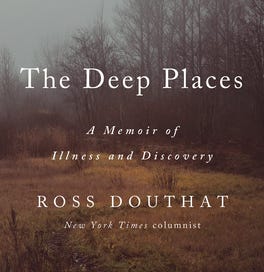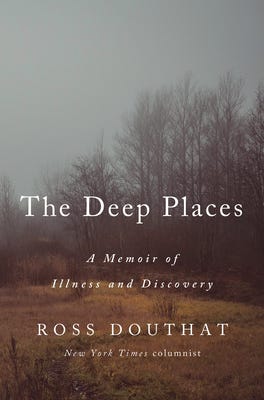Book Review: The Deep Places: A Memoir of Illness and Discovery by Ross Douthat
The Deep Places: A Memoir of Illness and Discovery by Ross Douthat (Convergent Books, 2021)
With two young girls and another child on the way, New York Times columnist Ross Douthat and his wife Abby long for a change from Washington D.C.’s hectic pace. In summer 2015, the couple decide to purchase a large home in their native Connecticut, envisioning an idyllic return to a simpler, quieter lifestyle and closer proximity to their extended family.
Several weeks before their move, Ross awakens with a stiff neck and an enlarged lymph node. A doctor prescribes antibiotics, to no avail; soon, his symptoms include chronic pain and a vibrating sensation throughout his body. Unbeknownst to him at the time, he was bitten by a tick while outside during the home inspection of their new home, leading to a diagnosis of Lyme disease. Douthat’s frustrating odyssey of trying to find answers for a complex illness and the toll it takes on your mental health and your relationships with others will resonate with anyone who has experienced the same.
And if you or a loved have experienced a chronic illness, you’re often painfully aware of the emotional chasm that often develops between yourself and people whose lives aren’t consumed by a parade of doctor’s visits, medications, and the limitations that one’s condition can place on life.
Douthat captures this experience with eloquence.
“Human beings have a great capacity for kindness, empathy, and help, but we are more likely to rise to the occasion when it is clearly an occasion — a moment of crisis, a time-bound period of stress. In the aftermath of a hurricane, society doesn’t usually fragment; it comes together in solidarity and support. Likewise with families and individuals facing suffering in the moment that it descends, or when a terrible finally bottoms out: Not always but very often, people behave well, with great generosity, in the face of a mortal diagnosis, a mental collapse, an addict’s nadir. Not least because in those circumstances there are things you can clearly do, from the prosaic–making frozen dinners for a suffering family–to the more dramatic and extreme, like flying across the country to help drag a friend into rehab.
But when the crisis simply continues without resolution, when the illness grinds on and on and on–well, then a curtain tends to fall, because there isn’t an obvious way to integrate that kind of struggle into the realm of everyday life. It’s not clear what the healthy person is supposed to give to a friend or family members who isn’t dying, who doesn’t have some need that you can fill with a discrete act of generosity, but who just has the same problems–terrible but also, let’s be frank, a little boring–day after depressing day.
‘Pain is always new to the sufferer, but loses its originality for those around him,” the nineteenth-century French writer Alphonse Daudet, wrote of his experience of a different spirochetal infection, syphilis, whose pain could be managed but in his case never cured. ‘Everyone will get used to it except me.’
Or alternatively, in an age of scattered friendships and virtual connection, everyone will forget about it except me.”
And this:
“…I became accustomed to the surprised reactions of friends and relatives when we reconnected and they found out that I wasn’t feeling better yet. After all, months had passed since we’d last spoken, and I clearly wasn’t dying, so I must be better. I must be on the mend….Mixed in with the surprise, I always heard a hint of disbelief–but then, I was conditioned to hear it, and probably I was being unfair to their well-meaning incomprehension.”
I could understand their bafflement, because I remembered what the term ‘chronic illness’ had meant to me in the before times….I still associated it with the fatigue that comes after you’ve stayed up with a newborn baby, or the aches and pains you feel after exercising for the first time in month–suffering that was challenging but manageable, with recourse, in the worst case, to an exhausted sleep. Whereas the reality was pain that didn’t let you relax, let alone sleep; pain that made your body feel like a cage around your consciousness; tension, always tension, the opposite of a Victorian lady picturesquely swooning on a couch. All this was an education, an experience of what it meant to be an embodied human being that could be endured but not really explained to someone whose body was still a home, a cooperator, a friend.”
The Deep Places is a beautifully written, honest, no-holds-barred memoir that will resonate with anyone coping with a chronic illness and those who love them. 5 out of 5 stars.
The post Book Review: The Deep Places: A Memoir of Illness and Discovery by Ross Douthat first appeared on melissa firman.
Related posts:
Sunday Salon Happy Easter, Happy Passover, and Ramadan Mubarak to all who are observing. I read that this convergence occurs every 33 years. Easter has long ceased to be a religious holiday...




